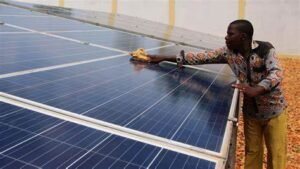Nigeria is taking bold steps to harness the power of solar energy, yet significant challenges remain. As the country faces an ever-growing demand for electricity, solar energy presents a promising solution. However, obstacles such as high initial costs, unreliable infrastructure, and regulatory hurdles continue to slow progress. These challenges are not unique to Nigeria, but the country’s massive potential for solar energy makes overcoming them crucial for its future.
The first hurdle is financing. While solar technology has become more affordable, the upfront investment for large-scale solar farms remains high. This makes it difficult for both the government and private sector to commit to large projects. However, the long-term savings and environmental benefits make solar energy a smart investment. As more affordable financing options and public-private partnerships emerge, this barrier is becoming easier to overcome.
Another challenge is the lack of infrastructure. Solar energy requires a stable grid system to distribute power effectively. Nigeria’s current power grid is outdated and unreliable, making it difficult to integrate solar energy on a national scale. However, recent investments in grid upgrades and energy storage systems are helping to bridge this gap. These advancements enable solar energy to be stored and distributed more efficiently, ensuring a more reliable power supply.
Regulatory and policy challenges also play a significant role in slowing solar energy growth. There is a need for clear and supportive policies to drive solar adoption. The government has made strides in this area, introducing policies to encourage renewable energy investment. However, bureaucracy, red tape, and inconsistent enforcement can still hinder progress. By streamlining regulatory processes and providing incentives for solar energy projects, Nigeria can create a more favorable environment for growth.
Despite these challenges, Nigeria’s potential for solar energy remains vast. The country is located in one of the sunniest regions of the world, with an average of 6 hours of sunlight per day. With the right infrastructure, policies, and financing, solar energy could significantly reduce Nigeria’s reliance on fossil fuels and help provide clean, reliable energy for millions of people.
Solar energy not only offers environmental benefits but also economic opportunities. It could create jobs, reduce energy poverty, and improve access to electricity in rural areas. As Nigeria works to overcome these challenges, the country has the potential to lead the way in solar energy adoption in Africa.
By investing in solar energy today, Nigeria can secure a brighter, cleaner, and more sustainable future for tomorrow. The journey may be challenging, but the rewards are undeniable. With continued focus and innovation, Nigeria can turn its solar energy potential into a powerful force for change.


